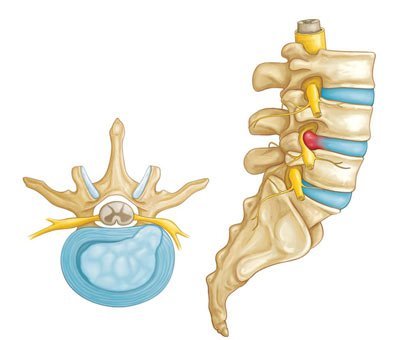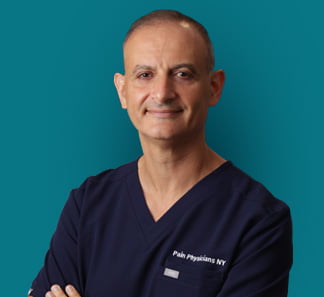When you experience back pain, rely on the expertise and experience of the best Midtown back pain specialist to receive the most accurate diagnosis and treatment. Herniated disc treatments can drastically affect your quality of life, so don’t wait to call — learn how to fix a herniated disc so you can return to your active lifestyle. Your specialist at Pain Management NYC is nearby to help you protect and care for your back and spine.
The discs in your spine act as a doughnut-like cushion between your back’s hard bones, known as vertebrae. The jelly-like substance in the center of the disc provides that cushion. It’s similar to air escaping from a cushion or balloon if it leaks out of your disc due to injury or compression. Depending on where the damaged disc is located, the padding and protection become less effective, resulting in upper back pain, middle back pain, or lower back pain.
At the top pain center in Manhattan, like Pain Management NYC, your doctor talks to you about herniated disc treatments if he determines that one or more of your vertebral discs has developed a leak. These types of problems are also referred to as a ruptured disc, bulging disc, protruding disc, or slipped disc. The result is usually a painful pinched nerve.
Risk Factors For A Herniated Disc
The most common risk factors for a herniated disc include:
- Sedentary lifestyle
- Weight gain
- Lack of regular exercise
- Occupations that require lots of heavy lifting
- Poor lifting technique, especially over time, which causes repetitive motion injuries
- Genetic conditions or a predisposition to back problems in your family
- Significant or sudden weight gain
Causes of Herniated Disc Symptoms
A herniated disc usually results from normal age-related wear and tear, which causes a condition called disc degeneration. Another cause that may force you to search for injury doctors near me is a sudden injury resulting from the muscles supporting your spine losing their strength and flexibility.

- Occupations that require lots of heavy lifting
- Poor lifting technique, especially over time,which causes repetitive motion injuries
- Genetic conditions or a propensity for back problems in your family
- Significant or sudden weight gain
The overriding concern regarding herniated discs is the compression of adjacent nerves. If the compression is related to a herniated disc in your neck, you may have numbness, tingling, and loss of function in your arms and fingers. You may also lose your ability to turn your head. Lumbar herniated disc compression commonly affects a bundle of nerves near your waist in your lower spine. This compression may necessitate immediate medical attention to avoid permanent nerve damage in your lower abdomen and legs.
Common Herniated Disc Symptoms
Some individuals with herniated discs experience no symptoms at all. In case you do have symptoms, the location of your herniated disc determines them. If your injured disc is in your neck, you may have sharp pains in your arms or shoulders. Sharp pains may run down your leg if the disc is located in your lower back. Coughing, sneezing, or certain motions can trigger the pain.
It’s also common to experience weakness, tingling, or numbness as a result of the compressed nerves, similar to a hand or arm falling asleep. These sensations might be persistent and aggravating because it seems that the limb will not wake up. The weakness may also make it difficult to grab or lift objects or even walk.
Seek emergency medical attention if you experience sudden bladder or bowel problems, pain that becomes worse enough to affect your daily activities, or any loss of sensation in your inner thighs, back of your legs, or around your rectum. Loss of sensation may signal compressed nerves that may become irreparably damaged.
How to Diagnose a Herniated Disc?
Your doctor must assess and diagnose your herniated disc before it can be treated properly. A thorough physical exam helps evaluates your mobility and symptoms, while a thorough medical history provides your doctor with a complete picture of your condition and health. Your spine specialist may check specific points of pain, your muscle strength, and your ability to feel sensations like pricking or vibrations. He also pays attention to your gait and reflexes.
Your spine specialist may order imaging tests to help diagnose your condition. The diagnostic procedures used to show the stage and location of a disc herniation include:
- Magnetic resonance imaging (MRI)
- Myelography
- Electromyography (EMG)
- Computed tomography scan (CT scan)
X-rays may also be required to rule out problems including fractured bones, abnormalities in the bones, infections, tumors, and problems with the spine’s alignment.
Herniated Disc Treatment in NYC
Conservative treatment for a herniated disc begins with medications such as over-the-counter pain relievers. Other medications may include anti-seizure medications, pain-relieving antidepressants, muscle relaxers, and narcotics. Other treatment options include:
- Spine-specific physical therapy for strengthening compromised muscles and increasing flexibility
- Trigger point injections with pain blockers and steroids to reduce inflammation
Herniated Disk Surgery
If your condition is steadily improving, conservative treatment may be all that’s required. If physical therapy, cortisone injections, and other medication fail to bring relief within a period of at least six to twelve weeks, surgery may be recommended. In rare circumstances, having the procedure sooner may be warranted by motor weakness. Patients with cauda equina syndrome require immediate surgical intervention. Surgical options to treat a herniated disc include:
- Minimally invasive surgery, such as a lumbar discectomy, which may be required to remove a protruding portion of a disc, fuse two vertebrae, or implant an artificial disc for increased support and cushion.
- In a posterior cervical laminectomy, the surgeon relieves pressure on the spinal cord and alleviates swelling of surrounding nerves by removing or trimming the bone covering the nerve (lamina) through the back of the neck.
- Cervical corpectomy allows decompressing of the cervical spinal cord and spinal nerves by removing a part of the vertebra and nearby intervertebral discs.
How Long Is Recovery for Herniated Disk Surgery?
Recovery after herniated disk surgery normally lasts six weeks and involves a course of physical therapy beginning in the second or third week following surgery. By the end of the fourth week, you ought to feel almost totally recovered. After that, you can gradually resume your regular daily activities, returning fully to high-intensity activity by the sixth week. Follow the course of treatment that your doctor has recommended to recover and stay pain-free. Make sure you visit your doctor regularly and let them know if your condition is not improving.
Prevention Is the Best Cure
Finding ways to prevent further herniation may be the most effective method of herniated disc treatment. For example, if your genetics predispose you to disc concerns, a top-rated NYC pain management doctor may advise you to exercise regularly, stretch frequently, maintain a healthy weight, be mindful of maintaining good posture, and either stop smoking or abstain from starting.
Schedule a consultation with Pain Management New York to learn how to fix a herniated disc or to determine if you have one. Contact a top back pain specialist in Midtown to address your herniated disc symptoms and get you back to living pain-free.

Boleslav Kosharskyy, MD, is a top-rated, best-in-class interventional pain management doctor. He is board-certified in Anesthesiology, Interventional Pain Medicine, and Palliative Care.
Dr. Kosharskyy is an Associate Professor of Anesthesiology and Rehabilitation Medicine at Albert Einstein Medical College. He’s also the Associate Medical Director of Pain Medicine and Director of Anesthesia for the Joint Replacement Center at Montefiore Medical Center and Albert Einstein Medical College.
He is an active member of the American Society of Anesthesiology (ASA), the American Society of Regional Anesthesia and Pain Medicine (ASRA), and the New York State Society of Anesthesiologists (NYSSA)
